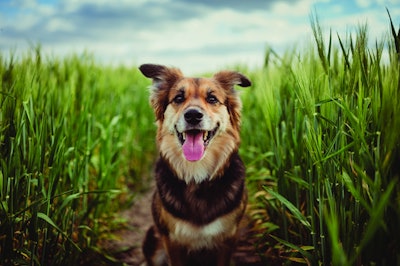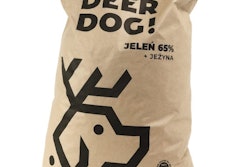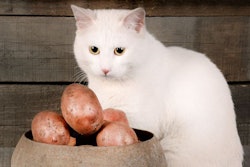
In an internet-based questionnaire, dog owners who fed plant-based diets to their pets reported fewer health problems in their pets. In particular, the dogs’ owners reported fewer disorders of the eye, gastrointestinal tract and liver in their dogs than owners of dogs fed conventional diets. Dog longevity was longer in the plant-based diet group's responses. Likewise, those dog owners did not perceive adverse effects on their pets’ health from plant-based diets. The journal Research in Veterinary Science published the results.
Despite the positivity around plant-based dog foods, the researchers noted that those dog owners may have been biased and skewed the results toward supporting herbivory. To avoid cognitive dissonance, vegetarian and vegan pet owners may have perceived the effects of plant-based diets on their pets as more beneficial than they really were. Similarly, pet owners with good experiences may have been more motivated to participate, while dogs’ negative reactions to plant-based diets didn’t elicit an urge to answer a questionnaire.
Sarah Dodd, PhD, of the University of Guelph, led the study on dog owners' perceptions of their pets’ reactions to plant-based foods. The questionnaire examined dog characteristics, husbandry, health and well-being. An earlier study led by Dodd examined similar themes among cat owners.
Cat owners report no plant-based diet health problems
As vegetarian and vegan diets become increasingly mainstream, pet owners want their companion animal’s diets to match their own edibility ethics. For dogs, which evolved to vacuum up human left-overs, this isn’t as much of a problem. Cats require more caution. In nature and the margins of human habitation, cats eat other animals or the pieces thereof. However, cat digestive systems can handle plant-based nutrients, allowing the inclusion of grains, fruits and vegetables in cat kibble and wet food into properly formulated cat foods. Some animal nutritionists have raised concerns as vegetarian and vegan diets for cats have grown in popularity. To address this, Dodd conducted a survey of 1,325 cat owners, published in BMC Veterinary Research in 2021. Of those, 65% fed their cats a meat-based diet, while 18.2% fed a plant-based cat food. The cat owners reported their own observations of their cats’ health.

















